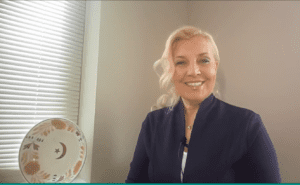Media Literacy is a Peacebuilding Tool. Member Spotlight: Ayce Ozerdem
Who is Ayce Ozerdem?
 Ayce is a journalist and broadcaster, she worked in Turkish radio and television as a broadcaster, after that she moved to work with Hürriyet Newspaper as a journalist.
Ayce is a journalist and broadcaster, she worked in Turkish radio and television as a broadcaster, after that she moved to work with Hürriyet Newspaper as a journalist.
Her presence in the Turkish media is big, she had written several books, and she had her own documentary called “Pioneer Women of Turkey”, as one of her main interests fall in the field of women rights and minority rights.
As part of her postgraduate study, she decided to specialize in conflict resolution, however, her main research focus was on peace journalism, which is linked directly with her field of work in media.
To support women, you need a role model
Ayce, see women right as “issues in every country”. In Turkey, she focused mainly on women’s issues, especially those hidden issues, therefore her main goal was to empower women using the idea of “role model” like the first female judge or the first female pilot…etc.
The main goal was to focus on pioneering women for adults and children, through documentaries and cartoons, in her mind she “did not want them to lose hope”, hence, presenting this method aims mainly to help women and young girls to have confidence in themselves and to empower them to reach their ambitions and dreams.
How can journalism support peace?
In her view, journalism and the media are very important tools capable of supporting peacebuilding and conflict resolution, especially in the current world, especially in light of the increasing number of news websites, newspapers and social networking sites. She sees that “people are easily influenced and affected by what they read and hear” thus, during peacebuilding processes, no one thinks of these effects on the rest of the individuals involved in the process.
Ayce see that the “media role is not neutral, but it mostly negative”, therefore, there must be caution and monitoring of the media’s effects on peacebuilding and conflict resolution, because in the end media cannot be impartial, she sees that in the media world “if there is blood, then there is news”.
What can be done to guarantee the good use of journalism?
“Everyone has to take responsibility for what you write and present even in social media”. In this context, she sees that this responsibility should come from “inside the journalists themselves” otherwise it will not work, therefore, there should not be an external observer because that would become undemocratic.
The process as peace journalism sees it in her point of view, must begin with training the individuals themselves to assume their responsibilities during their work within the press in order to monitor the effects that result from their work within the media on every event around them using “universal rules that applied for every person”.
Journalism is more than one course
In this context, Ayce believes that journalism has become more than just a teaching subject in universities, but rather it has turned into a more spacious and spaced society, with the increase in social media platforms.
In her opinion, journalism should become a part of the daily life and culture of all individuals, especially children. For example, she sees “we should train ourselves of what are we getting off the media“ because in this world no one can stop another from using media platforms, hence, people need to train themselves to “question everything we hear from the media”.
Ayce, present the term “media literacy” as an important tool to not only media workers but to all people of all ages especially to youth and children, to raise awareness about how to use media, and what to do with what you hear from it, and how to trust media.
Article by Yousra Hasona, MBBI Writer
